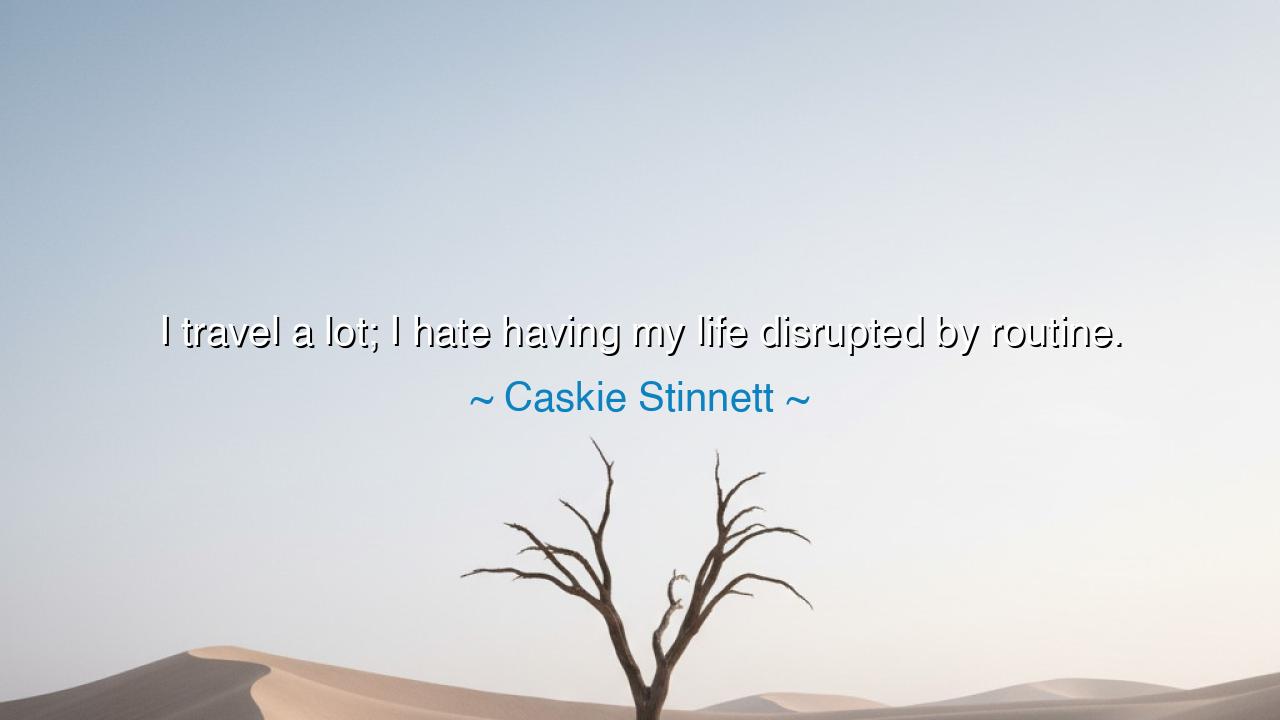
I travel a lot; I hate having my life disrupted by routine.






"I travel a lot; I hate having my life disrupted by routine." Thus spoke Caskie Stinnett, traveler, writer, and observer of the human condition. In these words lies a paradox that is at once playful and profound: that while many cling to routine as their anchor, he found it a chain, preferring instead the freedom of travel. For him, the disruption was not the journey, but the monotony of repeating the same patterns day after day. His heart longed not for predictability, but for the wild openness of the unknown road.
The ancients understood this hunger. The poets sang of Odysseus, whose life was not at peace in the comfort of Ithaca until he had wandered far and endured trial upon trial. They told of Herodotus, the “Father of History,” who left the safety of home to see the wonders of Egypt, Persia, and Babylon, recording the customs of strange peoples. To such souls, life without travel was not stability but stagnation. They sought disruption, for in disruption they found growth, and in new horizons they found renewal.
Stinnett’s disdain for routine speaks to the human soul’s deep thirst for freshness. Routines can keep us alive, but they do not always keep us awake. Day after day, the same actions can lull the spirit into slumber. But the traveler’s road stirs the senses—it confronts us with new sights, new voices, new foods, new dangers, new joys. Where routine numbs, travel awakens. And in this awakening lies the secret of why he preferred the turbulence of journeys to the stillness of daily repetition.
History offers us countless examples. Think of Ibn Battuta, the great Muslim traveler of the 14th century, who could not abide a settled life. He journeyed over 70,000 miles, across Africa, the Middle East, India, and China. He could have remained in one city as a scholar, safe and known, but his heart rejected routine. Instead, he chose endless movement, weaving his life into the stories of countless lands. His legacy was not a single home but the world itself.
Yet we must not mistake Stinnett’s words as rejection of discipline. For travel itself demands its own form of order—packing, moving, adjusting, learning. What he rejects is not responsibility but stagnation, not duty but monotony. In his creed we see the reminder that life is too short to be dulled by endless sameness. To live fully, one must embrace change as a teacher and novelty as a friend.
O children of tomorrow, take this teaching to heart: if you feel your soul grow heavy with sameness, dare to disrupt your own routine. You need not cross oceans to do so—sometimes even small changes can awaken the spirit. Walk a new path to your work. Speak to someone you do not know. Read a book outside your usual taste. And if fortune allows, then travel far, let new lands unsettle you, and let the unfamiliar make you new again.
For in the end, the wisdom of Stinnett is this: do not let routine swallow your life whole. Find a rhythm, yes, but do not let it become a cage. Make space for the unexpected, for the strange, for the wondrous. For it is in these disruptions that you will rediscover the joy of being alive.
Thus the teaching endures: travel awakens, routine can numb. Seek not the safety of endless sameness, but the richness of change. And when the road calls, do not fear the disruption—for in the disruption lies your freedom, your growth, and the eternal adventure of the human soul.






AAdministratorAdministrator
Welcome, honored guests. Please leave a comment, we will respond soon